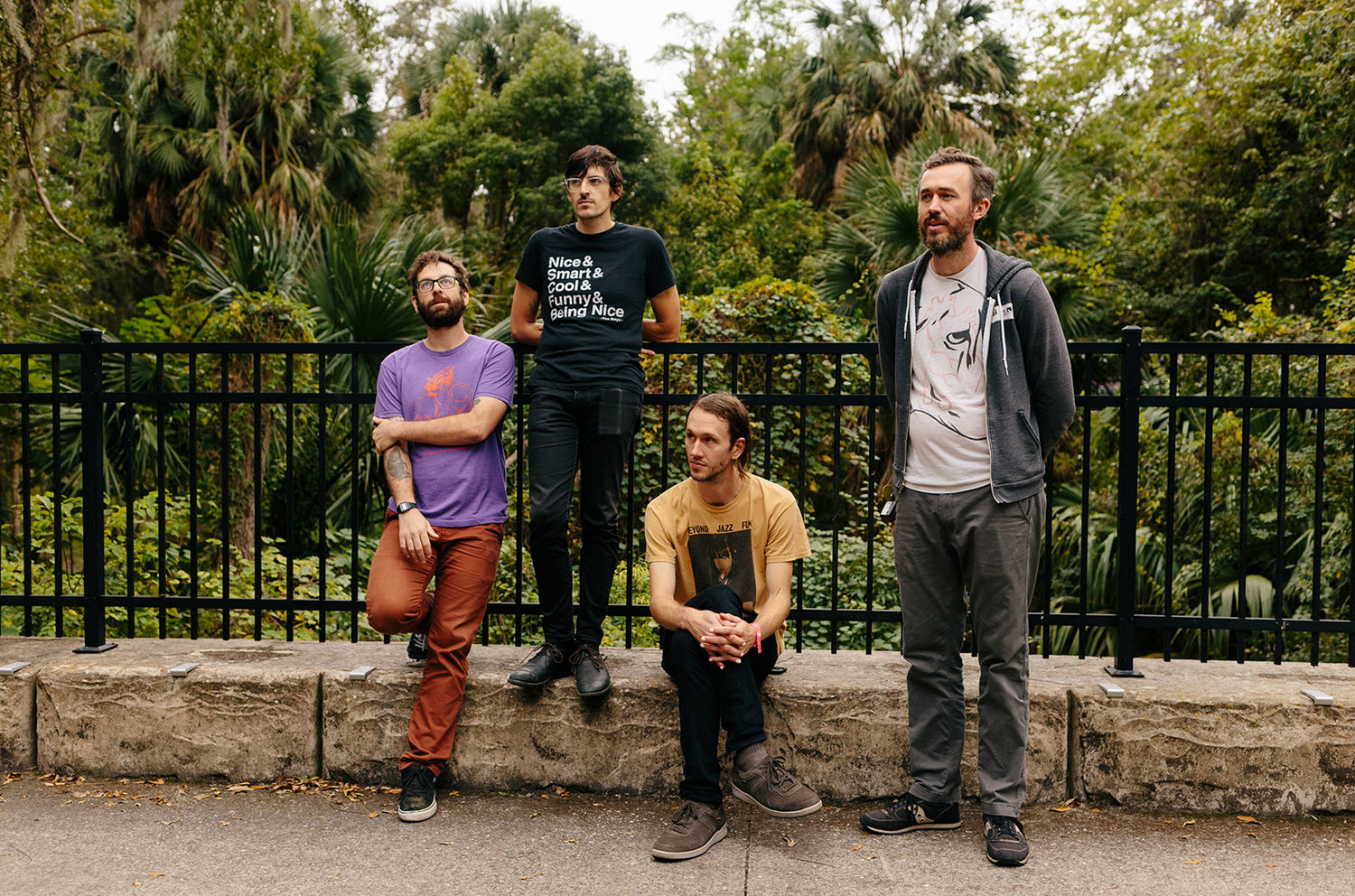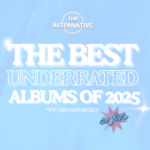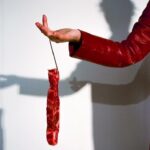Interview: Sean Bonnette of AJJ on ‘Good Luck Everybody’
Posted: by The Alt Editing Staff

Photo by: Giana Caliolo
Folk punksters, AJJ, have nearly topped Billboard charts with their seventh studio album, Good Luck Everybody. Hitting number two on Alternative New Artists, number two on Americana/Folk albums, and number four on Top New Artists, the group is over the moon with the album’s reception.
Good Luck Everybody is an ingenious mixture of the raw, stripped down, political, matter-of-factness, that popularized the band, and a polished cinematic sound fans started hearing on later albums, Christmas Island and The Bible 2. After the release of their third record, Can’t Maintain, the group started to gain major traction in punk circles. Acquiring a cult-like following, listeners loved the unfiltered nature of the band. Without much production, they set up shop and focused on highlighting the aspects of their sound that set them apart from their peers. Much of the group’s early work centered solely around Ben Gallaty’s signature upright bass, and Sean Bonnette’s acoustic guitar.
While folk punk has always been a disesteemed genre, AJJ have nearly pioneered the movement by making it palatable for listeners who are normally turned off by twangy riffs and legislative narratives. Good Luck Everybody pivots the group back to their raw roots. Written and recorded primarily by Bonnette and Gallaty, fans have rejoiced at the candid nature of the album.
When asked about this being a conscious decision Bonnette explained, “I fought hard against a lot of the themes, and I didn’t want to pursue political stuff as much. But I couldn’t really write anything else because that was what was on my mind. The more you try to ignore something, the more it forces itself to the forefront of your subconscious”.
Indeed, the political climate has left an everlasting imprint on all our minds, no matter how hard we try to escape it. With 2020 elections creeping around the corner and natural disasters killing thousands around the world, it is impossible to escape the ever-pressing consequences of our realities. While some seek music as a getaway, others find it extremely cathartic to face these problems head on – or maybe in the case of “Mega Guillotine 2020”, head off.
Existential dread aside, I had a delightful conversation with Bonnette about the nature of this record, why changing things up can be beneficial to musicians, and more. He starts the call in a way that almost mimics the nihilistic nature of the album, by telling me he has a flat tire on his car and is waiting for a tow truck to arrive. Despite this, there’s a warmth to his voice as he gabs about the delicious vegan burrito he just had for breakfast while catching up with the guys from Joyce Manor (who had just played Tucson the night before), making the flat tire seem a little less abysmal. Check out Good Luck Everybody as you read our conversation below.
It feels like this album is a bit closer to your roots. It’s a good mixture sound wise of your newer albums, but the lyrics kind of go back. Was that a conscious decision, or did it just kind of happen naturally?
I’m not sure that any decision that’s made for our band, especially with the songs, is ever a conscious decision. We’re a subconscious band all the way. But with this one, lyrically I fought hard against a lot of the themes, and I didn’t want to pursue political stuff as much. But I couldn’t really write anything else because that was what was on my mind. The more you try to ignore something, the more it forces itself to the forefront of your subconscious.
That said, I like the non-political songs a lot. The song “Maggie” is probably one of my favorite songs I’ve ever written.
Really?
And that one’s completely familiar, from a full place of love. I sing it to my dog, and she knows it’s about her.
I know you said that nothing is really a conscious decision, but I noticed the “No Justice, No Peace, No Hope”. Is that an expansion at all of “No More Shame, No More Fear, No More Dread”?
That was actually an unconscious placement. Jamie Coletta pointed out that that song is in the same order as “No More Shame, No More Fear, No More Dread” too. The last song of side A. But that was unconscious. I didn’t realize that at the time, but it lines up pretty well.
This record is self-produced. Do you enjoy self-producing more than having someone else produce it for you?
I’m not sure. We’ve only worked with one other producer, John Congleton, who’s a real joy to produce with, but even he claims to not really produce much. He sees himself as filling in what needs to be done as a producer. He doesn’t have a formula. And Jalipaz, I guess he would be technically an engineer, but he’s given some good production tips, and he takes a lot of liberties when he mixes. I’ll say for this one it was a lot of fun to self-produce, and to work on stuff with just Ben again. We have a pretty niche sensibility. And I couldn’t see this one going any other way.
What do you like about it? The freedom?
More control. Yeah. You have a lot of control. You can do as many takes as you want. And with this one, Ben and I really let our minds wander, and we experimented a lot.
But yeah, having all the control, getting to see your vision through and not have to share it with too many other people is nice. But also, that comes at the cost of collaboration. Our last two records were very collaborative, with our bandmates and with John. So, this one felt nicer to just take the reins, and fulfill our vision. Unshared.
Was having Jalipaz master it just kind of a no brainer for you guys?
Yeah. He knows what we’re supposed to sound like.
What do you like most about working with him?
I should say for this record we weren’t in the same room with Jalipaz when he was mixing. He just kind of sent us files back and forth. But the thing that I liked most about working with Jalipaz is hanging out with Jalipaz. He’s super funny. He is also a very good teacher. He can drop a lot of really awesome factoids, and I learn a lot about recording just by talking with them.
You’re also self-releasing it. What are some of the pros and cons of doing a self-release as opposed to a big label release, or even a smaller label?
The biggest pro is that you assume all of the reward. You don’t have to share any of the money with anyone else. You just spend the money you need to get the record out, and then once that’s done you get to collect all of the digital royalties, and all the physical royalties. And the con is that you also assume all of the risk. All risk, all reward.
In 2020, it’s actually really easy to put out your own record on kind of any scale you want. The role of the record label is severely diminished because we already have our audience. We don’t need a record label to find us an audience or sell us to anybody. They’ve already done it. They did a good job when it was going.
Would you say that you prefer self-releasing?
Yes. I would put records out on labels again, but this is perfect for this record.
Do you have any advice for any bands who might be looking to self-release their record, or maybe don’t know where to start, or advice, or inspiration for them?
Yeah. Use TuneCore because for $30 a year you can put up as many releases as you want, and you’ll get it on all the digital streaming platforms. Throw it up online first, and then figure out how many copies you should make. If you have a tour coming up, that’s good because then you can go on tour and sell those copies.
When we were first starting out, we would self-release music on CDRs, and it was pre-Bandcamp, pre-Spotify. It was a wild West. I miss burning CDRs, and folding paper, and stuff. That was super fun.
I read that it took you guys about three years to finish it. As far as the songwriting process goes, is that something that you kind of piece together slowly, or do you find that you sit, and start a song, and finish it?
It changes every time. It doesn’t seem like there’s ever any kind of consistent process to write a song. Sometimes they come out really quick, and those are my favorite. “Mega Guillotine” was an incredibly fast song to write. That song, “Poem”, same deal. Also, I kind of intentionally left them pretty repetitive, and very short and simple. Once again, my favorite kind of song. But then, “No Justice, No Peace”, that was a battle. I’d play that song so much. Trying to figure out which words to use. I wrote more than I needed and whittled it down.
Sometimes I’ll have a line sitting around for years, and years, and years, and still always have it in my mind until it finally finds the right place to go. That happened on this record with “Loud Mouth”. I wrote the first verse to that in probably 2012 or 2013, and then finally the time was right and it found the rest of the song.
I heard that Simon and Garfunkel had that with *sings* “Where have you gone, Joe DiMaggio, the nation turns its lonely eyes to you.” Paul Simon had that stuck in his head for a long, long time before he realized it would tack on really nicely at the end of that, and completely give that song a new meaning.
When I hear a song, I can tell, oh, this is an AJJ song. Aside from just what it sounds like, there’s just a style. How do you think that you’ve managed to separate yourself from your peers in that way, or do you feel like you have?
I think you’re more qualified to answer that question than I am. What do you think makes it an AJJ song when you hear it? How would you describe that style?
I don’t want to say it’s all one thought because it’s not all one thought, but it’s different, and it uses imagery in a different way that makes you uncomfortable, but then it goes back to being comfortable.
Huh, cool.
I don’t know how to answer that question either.
So you find something kind of challenging in it? Something uncomfortable? But in a way that is maybe conversational?
Yeah. You find comfort in it. Especially because there’s a lot about mental health and just day-to-day things that people struggle with, that they can find solace in. But there’s also lyrics that are different, songwriting that’s different, that makes you a little bit uncomfortable. Imagery. You’re like, “Oh that’s different.” But then, you have at the same time those moments where it’s like, “Oh, I feel like this, too.” You know?
Yeah. I’ve heard that the songs remind a lot of people of their internal monologue.
Yes.
Yeah. I think that’s probably what sets us apart from a lot of bands. Not all bands ,because there are definitely a lot of other people that are great at that.
What I’ve always admired about the band is with each release you aren’t afraid to change lyrics in the set list, change your band name, whatever it is. Why do you think that making those changes makes a difference?
They help us keep wanting to do it. If at some point if you’re doing something, and chugging along, and then you realize that a thing that you’ve been doing is kind of shitty, you can A: deny and keep doing it, B: quit altogether, or C: just make a change, and then try to keep doing what you’re doing. And yeah, we’ve definitely just tried to do that.
It’s upsetting to some people that we changed our name to make an accommodation for another group of people, or that we’ve had a change of heart, but fuck them. If I have a change of heart, I’m going to change my behavior.
Do you think that it’s important for musicians to make these changes?
I’m definitely in no position to tell any other band what they should do. I can only speak for me. And even then, it’s kind of on a song by song basis. Because you do want to honor that original feeling you had, but let’s say if there’s a choice of word that could be changed or updated, probably not the worst thing to just do that if you want to keep playing the song. You can also stop playing the song, and just let it exist on record. If it already exists in one form on an album, it doesn’t necessarily need to stay that way forever. Especially if you’re performing it live. It’s living if you’re playing it live. It’s alive.
That’s a good way of explaining it. Do you feel like it helps foster a safer environment for fans, or do you think that it changes anything at your shows? Or is that just kind of a personal thing?
There’s a song that I’m thinking about changing the words that we play a lot, and it’s a song that means a lot to people, and it does have some words that definitely stress people out sometimes. And yeah, I’ve kind of been struggling to find the right change to make in that song to make it less distressing to the people that it’s going to upset while at the same time trying to preserve it for the people for whom that song means a lot.
I would say, yeah, if you have words that distress people, you need to either be okay with stressing people out, change, or stop it. I think I’m going to try my best to change up “the rapist and a Nazi living in our tiny hearts” line from that one song. I could also just defend that choice if I wanted to because I do mean that line still. It’s a weird one.
How do you think that you’ve been able to foster your fan community? Do you think that they’ve impacted the band’s career in any way?
They’ve certainly impacted the band’s career. They’re the reason we have a career. One thing we have in common, I’ll say between myself and the listeners of our band, is that we both connect on these songs. I get a lot out of writing the songs. It’s very therapeutic, as all art is. When someone listens to that song and connects with it, then we immediately have a connection whether we know each other or not. And most of the time we don’t know each other. And when we do, it’s kind of on a very surface level. A lot of people don’t know about what I keep private. But there’s an even more private part of my soul that I choose to share and that’s this song.
Anytime we meet someone for listening, we always try to make sure that they know that we appreciate that, and to treat those people with dignity and respect. And at our shows, trying to make sure that no one gets hurt intentionally or unintentionally by people that are too excited, crowd surfers or whatnot.
What are some of your goals with this release? Do you have anything specific that you want fans or maybe new listeners to take away?
It’s generally the same overarching message, which is just to be nice to other people. Try to reach out and find understanding with those you disagree with. Like my friend Kimya says, “you don’t have to be nice to your oppressors”. But, trying through human connection to make the world, or at least your personal zone a better place is what I hope people take away. And then, in a more direct note, on our next tour we hope to get as many people registered to vote as we can. We’re going to be working with them within an organization, and try and make that happen.
Is there anything else you want to add?
Oh man that question is like going into a record store without a list. I guess I’ll just leave it at, good luck everybody.
The Alternative is ad-free and 100% supported by our readers. If you’d like to help us produce more content and promote more great new music, please consider donating to our Patreon page, which also allows you to receive sweet perks like free albums and The Alternative merch.
_
Emily Kitchin//@deathnap4cutie










